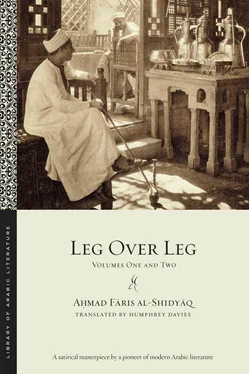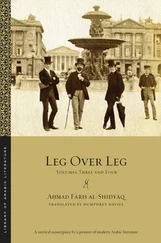549“ mustaqbiḥah and mustafẓiʿah ”: see 2.5.5 above; in fact, it is heads rather than bonnets that are so described.
550On ʿUlayyān, see Volume One (n. 138 to 1.3.13); however, no anecdote involving a chicken occurs in al-Nīsābūrī.
551“bag” ( haqībah ): literally, “a bag carried behind the saddle” and also, punningly, “posterior.”
552“well-known”: the Qāmūs defines a girl who is raṭbah as being rakhṣah and defines rakhṣ as “smooth.”
553“mentioned under burquʿ ”: there is no entry for burquʿ ; however, shanab (“lustrousness of the teeth”) is referred to in the earlier passage describing the charms of al-mutabarqiʿāt (“women who wear the burquʿ ”) (2.4.5), as are khanas and dhalaf , which are likewise linked below to burquʿ .
554 ʿanaṭ and ʿayaṭ are synonyms.
555“synonym abārīq ”: thus in the text, but, as the Qāmūs makes clear, abārīq is in fact the plural of ibrīq , which is synonymous with barrāqah .
556“having a certain quality welcomed in a woman during copulation”: this definition of ḥārūq is explained in the definition of al-ḥāriqah that precedes it in the Qāmūs and to which the author has referred earlier; see Volume 1 (n. 47 to 1.1.6).
557Ṣāliḥ is a prophet referred to in the Qurʾan (e.g., Q Aʿrāf 7:77); the People of the Cave ( ahl al-kahf ) are mentioned in the eponymous eighteenth sura of the Qurʾan.
558“or…”: the entry in the Qāmūs continues “a house roofed with a single piece of wood, synonym azaj .”
559“or…”: the entry in the Qāmūs continues “a place where people gather and sit for so long as they are gathered there.”
560“they”: i.e., pastoralists of the Arabian peninsula.
561“or…”: other definitions given in the Qāmūs are “a village, or a granary, or flat land, or houses of the Persians in which are drink and entertainment.”
562“or…”: the entry in the Qāmūs continues “for the harvester of truffles.”
563“a kind of building”: according to the Lisān , “a house built in elongated form, called in Persian ūsitān .”
564“or…”: the Qāmūs continues “a day on which they eat and drink.”
565al-Muqtadir: i.e., the Abbasid caliph Jaʿfar al-Muqtadir (ruled three times between 295/908 and 317/929).
566“a pool of lead” ( birkatun mina l-raṣāṣ ): more often described as having been of mercury.
567Al-Nuʿmān: i.e., al-Nuʿmān ibn Imruʾ al-Qays (r. AD 390–418), king of al-Ḥīrah, in the area of ancient Babylon in Iraq; the palace in question was named al-Khawarnaq.
568Uḥayḥah: Uḥayḥah ibn al-Julāḥ was a pre-Islamic leader of the Aws tribe of Yathrib (now Medina).
569al-Mutawakkil: an Abbasid caliph, r. 232–47/847–61.
570Dawmat al-Jandal: a town in northwestern Arabia.
571Khayzurān: mother of the caliph Hārūn al-Rashīd.
572ʿAmr ibn al-ʿĀṣ: a leading general of the Muslim conquests in the time of the Prophet Muḥammad and after (b. before AD 573).
573Wajj: a wadi east of Mecca and northeast of al-Ṭāʾif.
574“on which Adam… fell”: i.e., after being cast out of heaven, the mountain being situated in modern Sri Lanka.
575al-Jazīrah: the plain lying between the Tigris and the Euphrates, in Upper Mesopotamia.
576“the lote-tree beyond which none may pass” ( sidrat al-muntahā ): see Q Najm 53:14; this tree “stands in the Seventh Heaven on the right hand of the throne of God; and is the utmost bounds beyond which the angels themselves must not pass; or… beyond which no creature’s knowledge can extend” (Sale, Koran , 427 n. 1).
577Ibn Hishām: ʿAbd al-Malik ibn Hishām (d. 218/833), an Egyptian scholar of South Arabian origin, who wrote, in addition to the authoritative sīrah , or biography, of the Prophet Muḥammad, for which he is best known, a collection of biblical and ancient Arabian lore entitled Kitāb al-Tījān fī mulūk Ḥimyar ( The Book of Crowns concerning the Kings of Ḥimyar ); in the Qāmūs the name of the dead queen is given as Tājah, in the Tāj as here
578Ḥimyar: a kingdom of ancient Yemen that flourished between the first and fourth centuries AD.
579“the battle of Badr”: Ramaḍān 17, 2/March 13, 624, a victory for the Muslim forces of Medina over the pagans of Mecca.
580ʿAlī: ʿAlī ibn Abī Ṭālib (d. 40/660), the Prophet Muḥammad’s cousin, foster-brother, and son-in-law.
581ʿĀd: an ancient people of Arabia, mentioned in the Qurʾan (Q Aʿrāf 7:65, Hūd 11:59, etc.).
582“ nās, nasnās , and nasānis ”: since nās ordinarily means “people” the implication is that there are three kinds of humanoid — (ordinary) people, nasnās , and nasānis .
583Yājūj and Mājūj: Gog and Magog.
584“or the remainder of the bearers of the Proof, which no part of the earth is without” ( wa-baqiyyatu ḥamalati l-ḥujjati lā takhlū l-arḍu minhum ): a Tradition mentioned by al-Jawharī (see Lisān , s.v. r-b-ḍ ).
585“an ant who spoke to Sulaymān” ( namlatun kallamat Sulaymān ): a reference to Q Naml 27:18 “when they came on the valley of the ants, an ant said….”; since the ant did not in fact address Sulaymān directly, the verb has to be taken as meaning “spoke in the presence of.”
586“the ant mentioned in the Qurʾan”: see Q Naml 27:18.
587“Ibn Sīnā… the Shifāʾ ”: ʿAbdallāh ibn Sīnā (d. 428/1037), a philosopher of medieval Islam, known in the west as Avicenna.
588“cup his ears with his hands”: in the manner of a muezzin making the call to prayer.
589“‘Waḍḍāḥ’s Bone’” ( ʿaẓmu Waḍḍāḥin ): “A certain game of the Arabs… in which they throw in the night… a white bone and he who lights upon it overcomes [sc. beats] his companions” (Lane, Lexicon ).
590“ ʿuqqah ”: the dictionaries offer no further definition.
591“on which one plays” ( yuḍrabu bihi ): i.e., not ʿūd in any of its other senses (such as “stick” or “a certain perfume”).
592“honey” ( ʿasal ): all references to “honey” (in its complete form ʿasal abyaḍ or “white honey”) may be taken in the alternative sense of “molasses” (in its complete form ʿasal aswad or “black honey”).
593“ ḥays ”: dates mixed with clarified butter and curd.
594al-Maʾmūn: Abbasid caliph, r. 189–218/813–33.
595“fatty dishes or…”: the author appears to have misread the Qāmūs , which gives a different definition for makhbūr ( al-ṭayyib al-idām or “good-tasting condiments”) and in which khubrah is not a synonym of makhbūr but constitutes a new lemma, with tharīdah ḍakhmah as one of its definitions.
596“ sikbājah ”: not in the Qāmūs but presumably the same as sikbāj .
597“ ruṭab dates”: i.e., dates that are fresh but soft and sugary (and neither fresh and astringent nor dried).
598“ wars ”: a plant, Memecylon tinctorium , grown in Yemen, from whose roots a yellow dye (“Indian yellow”) is made.
599al-Faḥfāḥ and al-Kawthar: rivers in Paradise.
600“ tasnīm ”: the beverage of the blessed in Paradise.
Читать дальше












